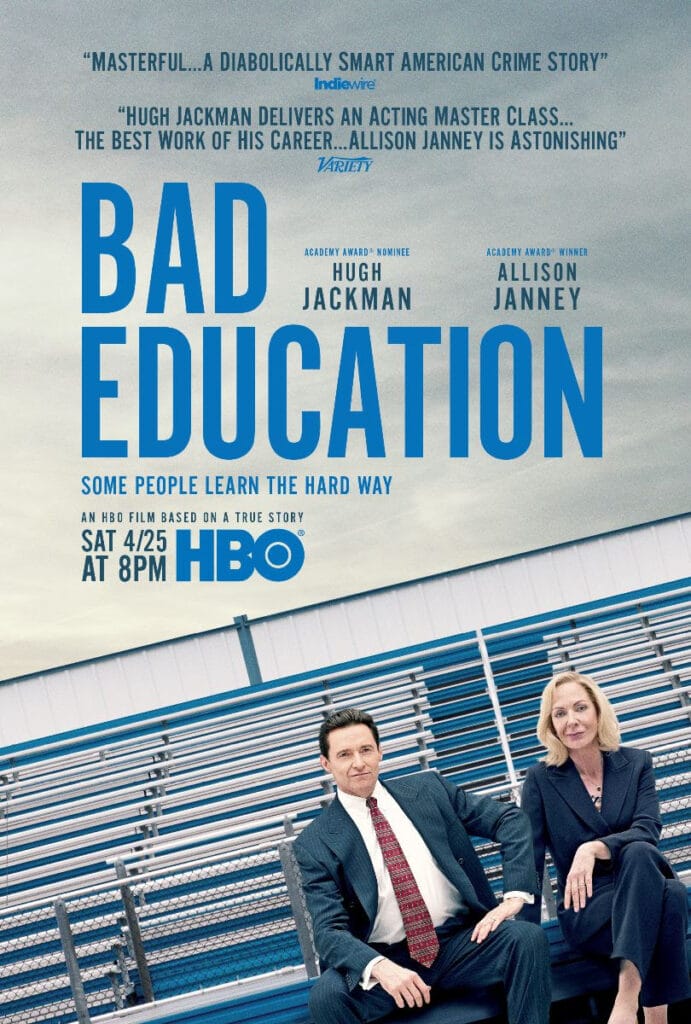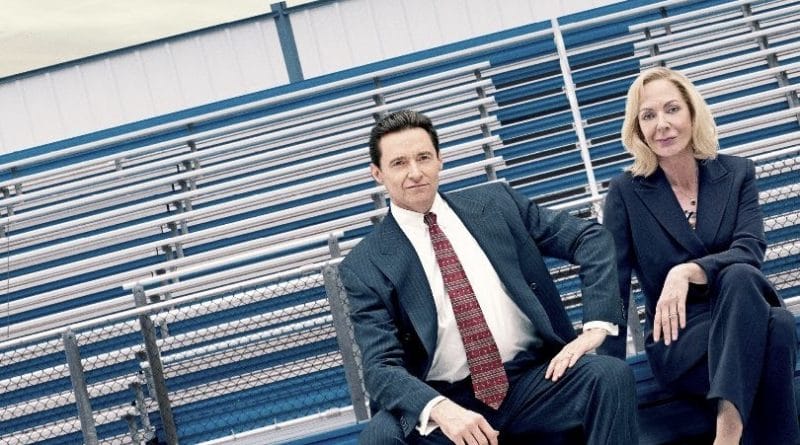HBO announces an official release date for their upcoming original film Bad Education, starring Hugh Jackman.
Inspired by the true story that rocked the town of Roslyn, NY in 2004 that garnered attention nationwide, BAD EDUCATION, debuting SATURDAY, APRIL 25 (8:00-9:30 p.m. ET/PT), centers on the stunning impact and aftermath of a multi-million-dollar embezzlement scheme. The darkly comical film highlights the deficiencies of the public education system in the U.S. while examining the broader forces that foster greed, corruption, and lack of accountability in our institutions.
Starring Academy Award nominated and Golden Globe and Tony Award winner Hugh Jackman (“The Greatest Showman,” “Les Misérables”); and Emmy®, Academy Award, Golden Globe and SAG Award winner Allison Janney (“I, Tonya,” “Mom”); the film is directed by Cory Finley (“Thoroughbreds”) and written by Mike Makowsky (“I Think We’re Alone Now”).
The film will also be available on HBO On Demand, HBO NOW, HBO GO and partners’ streaming platforms.

Predominantly shot in and around the Long Island town of Roslyn, fifteen years after the scandal came to light, the film, as realized by director Finley and writer Makowsky, is a carefully orchestrated comedic drama as it focuses on the dichotomy of Frank Tassone (Jackman) – both an ardent and passionate educator dedicated to seeing his students succeed, and an expert manipulator willing to steal from the very same people he was so eager to help. The film deftly uses this small-town story to examine the systemic failures that enabled him. Allison Janney plays Pam Gluckin, Dr. Tassone’s major domo and right-hand, the business manager for the Roslyn school district who worked her way up through sheer grit and passion.
Intelligently written and tautly directed, the film shows a community wooed by the charismatic superintendent and enamored by the school’s success and the resulting economic impact. It is also a celebration of the Roslyn High community – their ability to expose that dark time in the school’s history and their continued tenacity to remain one of the top schools in the country today.
BAD EDUCATION was a personal journey for writer Mike Makowsky, who returned to his hometown to research his screenplay. Accurately and respectfully conveying the essence of the overall story, he uses the historical events for a moral exploration of complicated and fascinating human behavior. Growing up in Roslyn, it was years before Makowsky would fully understand the implications of the case or discover that it was student reporters from his high school newspaper The Beacon who actually broke the story.
Ironically, the New York Times didn’t report the embezzlement scheme, purportedly the largest in American public school history, until one of their writers saw the copy of The Beacon his son had brought home from school. What started as a small, focused article in a high school newspaper ignited a media frenzy that led to further investigations and a reckoning for those involved.
“Mike’s script was unique, with a precise comic tone,” says Finley. “The facts of the story are over-the-top in a way that lends itself to black comedy, but there’s also a real tragedy to it. I’m always drawn to telling stories that walk those sorts of tight-ropes, and that deal in moral gray areas. I wanted to make a movie about a very specific time, place and culture, but in doing so, pose big questions about American culture — how our economic system shapes us, and what we’re willing to accept from those in power when it’s in our own interest.”
“Cory understood exactly what I was going for in the script,” says Makowsky. “He succeeded not only in executing, but amplifying, those ideas in surprising and exciting ways that I could never have anticipated.”
BAD EDUCATION, an HBO Films presentation, is directed by Cory Finley; written by Mike Makowsky, based on a New York Magazine article by Robert Kolker; produced by Fred Berger and Brian Kavanaugh-Jones for Automatik; Edward Vaisman, Julia Lebedev, and Oren Moverman for Sight Unseen Pictures; Mike Makowsky for Slater Hall; executive produced by Leonid Lebedev and Caroline Jacko.

